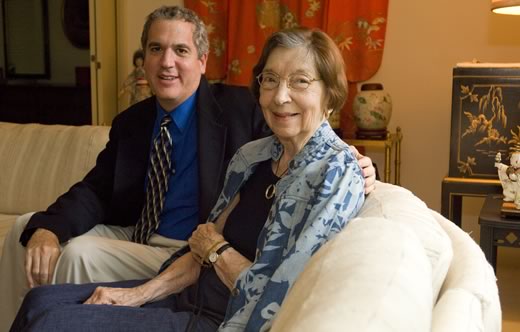The mind matters

Benjamin Druss and Beverly Long share a commitment to changing policy to improve mental health services for vulnerable patients.
by Valerie Gregg and Pam Auchmutey
A longtime advocate and an RSPH researcher give mental health and physical health equal billing in the public health arena
|
|
Petite and polite, Beverly Long accepted her honorary doctorate from Emory in 2007 with quiet grace. But her gentle demeanor belies her stature as a public health leader.
"Her vision brought mental health into the purview of public health at Emory," says Benjamin Druss, who holds the Rosalynn Carter Chair of Mental Health at the RSPH. "She has worked tirelessly as an advocate for mental health care since the 1970s, when she worked with Mrs. Carter at the state level, and later, on the global stage with the World Federation for Mental Health. Throughout those years, Ms. Long has been passionate about bringing mental health into public health."
When Long made the initital proposal and contribution to endow the Rosalynn Carter Chair of Mental Health several years ago, she was making a statement. The chair provides a professorship and program focused on prevention of mental disorders and the promotion of mental health. It also honors Mrs. Carter for bringing national and world attention to mental health issues.
"Prevention is the key," says Long, a civil rights advocate who has worked with President and Mrs. Carter for more than three decades. "It's taken people a long time to catch on, but they're starting to understand that mental health means more than just mental illness."
The chair that Druss holds is the first of its kind in the nation—a mix of academic research in the RSPH with The Carter Center's action-oriented agenda. A physician with an MPH from Yale University, Druss holds appointments in health policy in the RSPH and psychiatry in the Emory School of Medicine and works with The Carter Center as a member of its Mental Health Task Force and Mental Health Journalism Fellowship Advisory Board.
Integrating mental health care into public health is challenging but crucial, says Druss. Medicine in general has long considered the mind to be separate from the body, and psychiatry has been something of an outlier among medical specialties. But now, public health is playing an increasingly important role in bringing psychiatry and medicine together.
The Carter Center's Mental Health Program is oriented toward changing public policy, not just studying it. This uncommon mix is what brought Druss from Yale to Emory in 2003.
"My position as the Rosalynn Carter Chair of Mental Health is unique," he says. "It allows me to serve as a bridge between public health and clinical care, research and mental health policy, and The Carter Center and Emory."
Falling through the cracks
Druss's research examines care for people on the primary care/mental health interface in the public sector, where many of the most vulnerable patients receive care. Most are poor and have limited or no insurance. Patients may fall through the health care cracks on either side—primary care or psychiatry.
The system is now oriented more toward treating disease than keeping people well. Druss offers the example of a male patient who receives regular treatment for schizophrenia at a community mental health center. He takes an anti-psychotic drug to control his symptoms, and he is stable.
The patient's psychiatric symptoms are well controlled, but he doesn't have a primary care doctor—he goes to the emergency room for basic care. When he visits the ER for back pain, the doctor sees his psychiatric history and refers him to an inpatient psychiatry unit. Only later do the doctors learn that he has a kidney infection and is also diabetic. He is not taking good care of himself, and his weight gain is partly a side effect of his psychiatric drugs.
"People with serious mental illnesses often fail to receive the medical services they need," says Druss. "Alternatively, people who are treated in the public sector often fail to obtain needed mental health services in primary care."
Consider the patient who visits her primary care doctor with several complaints. During her visit, the doctor asks her if she has been feeling sad, and she admits to feeling very down. The doctor prescribes an antidepressant. The woman begins taking the drug, experiences a few side effects, and stops taking the medication within a week. She doesn't call her doctor or follow up.
Thus treatment for her depression is short-lived. Each year, approximately 19 million American adults suffer from a depressive disorder, according to the National Institute of Mental Health. The most prevalent of these illnesses is clinical depression, the leading cause of disability in the United States and the fourth leading cause of disability in the world.
Much work remains to be done on both sides of the primary care/mental health interface. People with mental illnesses continue to face great stigma and discrimination. Insurance companies often do not provide coverage for mental health treatment equal to that for physical health. And mental disorders affect one in five Americans.
Yet as a subject for public health research, mental health remains wide open. "The public health view considers whether one is using resources wisely," Druss says. "It is about reducing the burden of disease."
More information provided by public health research should encourage physicians to take mental illnesses more seriously. After the rise of psychoanalysis in the early 1900s, the treatment of mental illness remained mind-focused for much of the past century. Now physicians must learn to take a more holistic view.
"The medical system in general is oriented toward treating disease rather than treating a person with a disease," says Druss. "For people with more than one condition, it's critical that the system remember it is treating a whole person."
Still, patients with problems stemming from the brain are receiving more attention than ever. Through new technologies, scientists have learned the importance of brain chemistry and genetics in mental illnesses. New knowledge continues to yield new treatments.
Primary care physicians treat more than half of the people in the United States with mental illness, says Druss. A major reason is the development of newer antidepressants such as Prozac, which have fewer side effects and are easier for general internists to prescribe. However, effective follow-up is challenging in these settings. Primary care visits are brief and need to address not only depression but also the patient's other medical needs. Primary care providers rarely have the time or clinic infrastructure to check for side effects and the effectiveness of treatments for depression once they have been started.
Building critical mass
For the past two years, Druss has organized a "Mental Health Concentration," which provides a home for RSPH students with an interest in mental health. The concentration allows students to focus their elective time, thesis, and practicum on topics related to mental health. A monthly seminar draws up to 100 students and professionals from Emory, The Carter Center, local and state agencies, and the CDC to hear experts discuss clinical and policy issues. These meetings have built a critical mass in mental health expertise that can further help recruit faculty and students at the master's, doctoral, and postdoctoral levels.
"I'd like to see the RSPH become a premier place for expertise in mental health and public health," Druss says. "That involves continuing to knit together the resources we already have and building new partnerships."
In his research, Druss is working to move mental health policy and practice in new directions. One question he is exploring is how mental health consumers can use information technology to manage their care. Through a new study funded by the Agency for Healthcare Research and Quality, Druss and a team of consumers and providers will develop and test an electronic personal health record (PHR) for use by people with serious mental disorders.
Consumers will manage their password-protected PHR via the Internet to provide a central record that patients—and when authorized, health care providers—can access anywhere, anytime.
Druss's team will adapt a PHR developed by information technology experts and now widely used in Seattle. The Shared Care Plan, currently the primary interface for Microsoft's new HealthVault PHR platform, allows users to store and retrieve medical and medication information online. The record also prompts patients for upcoming preventive services and allows secured email communication with medical providers.
A PHR for mental health consumers would provide a central repository for mental health information that is often fragmented, says Druss. "A mental health PHR is a potentially important tool that takes advantage of the latest information technology to help coordinate and improve care for this vulnerable population."



